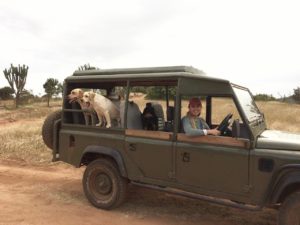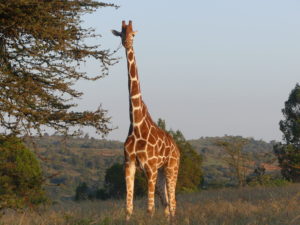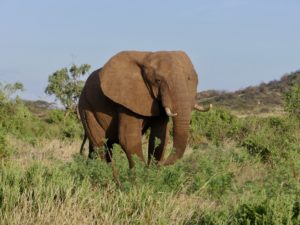by Julianne Nikirk
Growing up in Kenya provided Colorado State University student, Carly Butynski, a unique opportunity to foster her passion for conservation and sustainability. “Wildlife conservation, wilderness, and environmentalism were the cornerstones of my upbringing,” shared Butynski, “most of my free time as a child was spent on safari and fieldwork trips with my parents.”

Butynski, an undergraduate honors student in the Department of Human Dimensions of Natural Resources, was drawn to the human dimensions program due to its strong international reputation, applied course work, and alignment with her career aspirations.
“Professionally, I’m interested in systems of violent environmental conflict, especially those involving threatened species and vulnerable human populations. Finding long-term solutions to these issues, from an ecological and social perspective, is something I’d like to dedicate my career to,” Butynski shared.

Her most recent research has focused on conservation of African species threatened by habitat fragmentation, poaching, and illegal wildlife trade, including elephants and reticulated giraffe.
Butynski is currently working on her senior honors thesis, a project designed to address human/carnivore conflict in northern Kenya through a series of policy interventions. Her thesis advisor is human dimensions Associate Professor Brett Bruyere.
“So many conservation issues require humility, listening and patience in the process of sorting out a solution, and Carly epitomizes those characteristics,” Bruyere explained. “Commitment to conservation is fueled not just by the love and passion for natural landscapes and wildlife that epitomizes so many of our students; it is complemented by an ability to understand the extreme complexities of conservation issues while thinking through solutions, and Carly has tremendous aptitude to do that.”
When Butynski graduates in May, she will be returning to Kenya to work with Bruyere’s doctoral student, Sarah Walker, as part of a team studying the capacity for resiliency held by pastoralist women in the wake of climate change in Kenya. When asked about Butynski, Walker explained, “not only is Carly one of the most academically exceptional students I have ever worked with, but her ability to understand the big picture and adapt to changing dynamics has been a huge asset to the start of our research project that focuses on understanding the gendered dynamics of pastoral resilience to climate change in Samburu, Kenya.”

Walker further emphasized the importance of supporting emerging female conservation leaders like Butynski. She stated, “I’m excited that the future of conservation is going to be in the hands of people like Carly!”
After her summer project in Kenya ends, Butynski will be moving to Scotland to pursue an MSc in Environmental Conflict and Development from the University of Edinburgh.